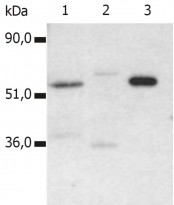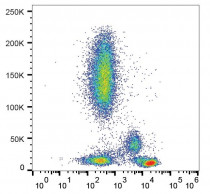ARG62832
anti-CD4 antibody [MEM-115]
anti-CD4 antibody [MEM-115] for Flow cytometry,Functional study,Immunoprecipitation and Human
Developmental Biology antibody; Immune System antibody; Regulatory T cells Study antibody; T-cell infiltration Study antibody; Tumor-infiltrating Lymphocyte Study antibody
Overview
| Product Description | Mouse Monoclonal antibody [MEM-115] recognizes CD4 |
|---|---|
| Tested Reactivity | Hu |
| Tested Application | FACS, FuncSt, IP |
| Specificity | The clone MEM-115 recognizes an epitope in the D1 domain of CD4 antigen, a 55 kDa transmebrane glycoprotein expressed on a subset of T lymphocytes (“helper“ T cells) and also on monocytes, tissue macrophages and granulocytes. It is negative in Western blotting even with non-reduced samples of cell lysates. HLDA V; WS Code T T-CD04.09 |
| Host | Mouse |
| Clonality | Monoclonal |
| Clone | MEM-115 |
| Isotype | IgG2a |
| Target Name | CD4 |
| Antigen Species | Human |
| Immunogen | Human thymocytes and T lymphocytes. |
| Conjugation | Un-conjugated |
| Alternate Names | CD4mut; CD antigen CD4; T-cell surface glycoprotein CD4; T-cell surface antigen T4/Leu-3 |
Application Instructions
| Application Suggestion |
|
||||||||
|---|---|---|---|---|---|---|---|---|---|
| Application Note | Functional studies: The clone MEM-115 blocks binding of HIV gp120 to CD4 molecule and it also strongly inhibits CD4-MHC Class II interactions. FACS: Although it has not been tested rigorously, following data suggest that the clone MEM-115 is a low-affinity antibody: its binding to T cells increases at elevated temperature; monovalent Fab fragments essentially do not bind to T cells. * The dilutions indicate recommended starting dilutions and the optimal dilutions or concentrations should be determined by the scientist. |
Properties
| Form | Liquid |
|---|---|
| Purification | Purified from ascites by protein-A affinity chromatography. |
| Purity | > 95% (by SDS-PAGE) |
| Buffer | PBS (pH 7.4) and 15 mM Sodium azide |
| Preservative | 15 mM Sodium azide |
| Concentration | 1 mg/ml |
| Storage Instruction | For continuous use, store undiluted antibody at 2-8°C for up to a week. For long-term storage, aliquot and store at -20°C or below. Storage in frost free freezers is not recommended. Avoid repeated freeze/thaw cycles. Suggest spin the vial prior to opening. The antibody solution should be gently mixed before use. |
| Note | For laboratory research only, not for drug, diagnostic or other use. |
Bioinformation
| Database Links | |
|---|---|
| Gene Symbol | CD4 |
| Gene Full Name | CD4 molecule |
| Background | CD4 is a membrane glycoprotein of T lymphocytes that interacts with major histocompatibility complex class II antigenes and is also a receptor for the human immunodeficiency virus. This gene is expressed not only in T lymphocytes, but also in B cells, macrophages, and granulocytes. It is also expressed in specific regions of the brain. The protein functions to initiate or augment the early phase of T-cell activation, and may function as an important mediator of indirect neuronal damage in infectious and immune-mediated diseases of the central nervous system. Multiple alternatively spliced transcript variants encoding different isoforms have been identified in this gene. [provided by RefSeq, Aug 2010] |
| Function | CD4 is an integral membrane glycoprotein that plays an essential role in the immune response and serves multiple functions in responses against both external and internal offenses. In T-cells, functions primarily as a coreceptor for MHC class II molecule:peptide complex. The antigens presented by class II peptides are derived from extracellular proteins while class I peptides are derived from cytosolic proteins. Interacts simultaneously with the T-cell receptor (TCR) and the MHC class II presented by antigen presenting cells (APCs). In turn, recruits the Src kinase LCK to the vicinity of the TCR-CD3 complex. LCK then initiates different intracellular signaling pathways by phosphorylating various substrates ultimately leading to lymphokine production, motility, adhesion and activation of T-helper cells. In other cells such as macrophages or NK cells, plays a role in differentiation/activation, cytokine expression and cell migration in a TCR/LCK-independent pathway. Participates in the development of T-helper cells in the thymus and triggers the differentiation of monocytes into functional mature macrophages. [UniProt] |
| Highlight | Related products: CD4 antibodies; CD4 ELISA Kits; CD4 Duos / Panels; Anti-Mouse IgG secondary antibodies; Related news: New antibody panels and duos for Tumor immune microenvironment Tumor-Infiltrating Lymphocytes (TILs) |
| Research Area | Developmental Biology antibody; Immune System antibody; Regulatory T cells Study antibody; T-cell infiltration Study antibody; Tumor-infiltrating Lymphocyte Study antibody |
| Calculated MW | 51 kDa |
| PTM | Palmitoylation and association with LCK contribute to the enrichment of CD4 in lipid rafts. |
Images (2) Click the Picture to Zoom In
-
ARG62832 anti-CD4 antibody [MEM-115] IP image
Immunoprecipitation: T cell lysate isolated from fresh buffy coats was immunoprecipitated with (1) none, (2) negative control antibody. (3) ARG62832 anti-CD4 antibody [MEM-115]. Western blot was stained with ARG62832 anti-CD4 antibody [MEM-115].
-
ARG62832 anti-CD4 antibody [MEM-115] FACS image
Flow Cytometry: Human peripheral blood stained with ARG62832 anti-CD4 antibody [MEM-115], followed by incubation with APC labelled Goat anti-Mouse secondary antibody.







